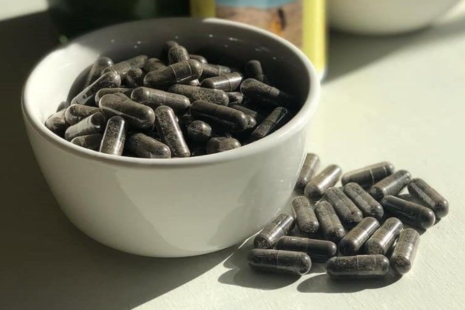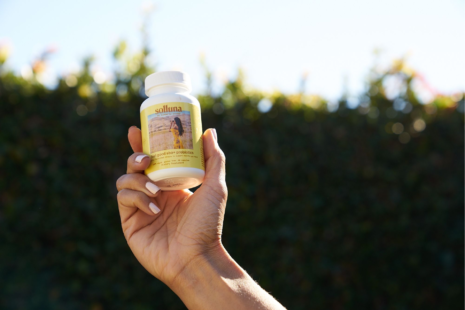
If you’ve ever wandered the store aisles or searched for a probiotic supplement online you’ve likely wondered what to look for and how to choose a probiotic supplement.
There are countless numbers of probiotic supplements to choose from, and it’s admittedly overwhelming. You start to wonder, does it really matter? Isn’t one probiotic just as good as the next?
In short, no. Not all probiotics are the same, and before you throw your hands up in the air completely overwhelmed and picking the bottle with the prettiest label (admittedly something I might do if I didn’t know what to look for), I’m going to share the most important things you should look for in an effective probiotic.
Probiotics can offer lots of health benefits in a tiny package, and everyone these days seems to be talking about their gut health benefits.
That’s great news because it means more and more people are seeking out probiotic supplements for better health. The bad news is, more and more manufacturers are creating probiotics supplements and focusing on all of the wrong things!
These are the things that really matter when it comes to how well your probiotic will support a healthy gut.
Why Reading a Probiotic Label Doesn’t Always Help
If you’re reading a probiotic label and hoping it will become crystal clear which probiotic you should choose, think again! If you don’t know what you’re looking for it can create more questions than answers!
You’re likely reading the label asking yourself… what’s a CFU and what’s the difference between 10 billion CFUs or 25 billion CFUs? Isn’t more always better?
What are the different strains of bacteria, like lactobacillus or bifidobacterium? Is one more important than the other?
What is a prebiotic and a postbiotic? Some probiotic bottles list them, others don’t. Do I need them?
What do all those words and numbers even mean?! It can be a lot to deal with, especially when you just want to find one thing that will work.
Four Things Your Probiotic Should Have
The best probiotic supplement for gut health at minimum should have these four things:
- Resilient strains of good bacteria that are able to survive your digestive system and make it intact to your gut
- Multiple diverse bacteria strains
- Supportive research demonstrating the probiotic strains’ ability to positively impact your health
- Ideally, they’ll include prebiotics to help them thrive!
Don’t worry Beauty, we’re going to walk through this together. I have written a lot about probiotics in the past— because there is so much to learn and explore about them! Once you know how to choose a probiotic supplement, selecting the right one for you will be a no-brainer.
What Are Probiotics?
We’ll start with the very basics. Basically, when the term “probiotics” is used, it’s referring to the beneficial (aka “good”) bacteria that support your gut health, and positively influence your overall health.
These beneficial bacteria help keep your gut and digestive health in balance, without them your body is unable to digest food or synthesize important vitamins.
When your gut health is balanced, the rest of your body and health follow suit. Your hair becomes softer and shinier, your skin glows, and you just feel beautiful inside and out. Your immune system also becomes more robust, which can help prevent illness. [1]
Your gut microbiome consists of both good and bad bacteria, but the good bacteria helps maintain the balance in your digestive system to make sure the healthy bacteria are never outnumbered by harmful bacteria. An imbalance in your gut microbiota can cause digestive upset, reduced immune function, and just a drop in your overall health.
How Do Probiotic Supplements Improve Your Health?
When you think of probiotics, you may only think of how they affect your digestion. But they benefit your body in more ways than simply boosting digestion of food, enhancing nutrient absorption and preventing constipation.
Probiotics can also benefit your hair health, mood, hormones, skin health, immunity, and so much more.
Healthy Mood and Immune Function
For instance, you’re able to optimize your mental health and immunity by focusing on your gut health because both are dependent upon a strong and resilient gut microbiome.
It’s said that 70% of your immune system resides in your gut, and the bacterial makeup (the balance of bacteria in the microbiome) heavily influences whether your body is chronically inflamed and susceptible to autoimmune disorders and illness. It’s also where the majority of your body’s “feel good” neurotransmitters that promote a calm and healthy happier mood are produced.
Healthy Skin and Hair
There are other outward signs too. When your gut is healthy you’re less bloated, your skin is more radiant and your hair is fuller and shinier.
Probiotics can promote healthy hair growth by treating or preventing the inflammation that can cause your hair to lose its natural shine, or even cause it to fall out! Probiotics also help balance your hormones. In turn, this stimulates hair growth and helps your hair grow back thicker and shinier than ever before.
Probiotics can help your skin glow too!
Probiotics help support your skin microbiome by supporting your gut. Like I mentioned earlier, probiotics balance your gut microbiome by maintaining the right amount of good bacteria to outnumber the bad bacteria. And when your gut is healthy, it helps keep your skin microbiome healthy. A healthy skin microbiome helps reduce the appearance of skin conditions like rosacea and eczema too.
When your body’s microbiomes are healthy, they help keep you healthy!
Related: How Probiotics Can Help Prevent Hair Loss and Promote Hair Growth
What Kinds of Bacteria are in Probiotics?
Probiotic supplements contain multiple species of good bacteria. These unique species of live bacteria each play their own role in your digestive health. A few of the different strains you may see in a probiotic product include:
- Lactobacillus. These bacterial strains are a primary species you’ll see in any probiotic. One strain of this bacteria, lactobacillus acidophilus, can help prevent infections, reduce eczema symptoms and balance your gut health. [2]
- Bifidobacteria. These are other common bacterial strains found in probiotic supplements. Bifidobacteria help your body process fiber and produce short-chain fatty acids. These compounds help support your gut health.
- Streptococcus. When you think of these bacteria, you may think of the ones that cause infections like strep throat. However, while the harmful bacteria can be in your gut right now, this probiotic strain is beneficial to your health and keeps those bad streptococcus bacteria in check.
- Bacillus. Bacillus bacterial strains are resistant to gastric acids found in the stomach and are heat resistant, making them a more resilient form of bacteria species. They’ve been studied and found to help support immune function and IBS symptoms including bloating and abdominal pain.
How to Choose a Probiotic Supplement That Fits Your Needs
The sheer number of probiotic supplements out there can cause confusion. That’s why it’s so important to know what to look for to choose the best probiotic supplement.
In addition to the four things we mentioned earlier that your probiotics should have, including multiple resilient strains able to survive your digestive system, prebiotics, and backed by research, here are four other qualities we suggest you look for when choosing a probiotic supplement.
- It must contain live and active bacteria. A probiotic supplement can’t help you if the cultures aren’t alive when you take the supplement. A shelf-stable probiotic that doesn’t require refrigeration typically contains heartier strains ensuring more are “live and active” upon ingestion.
- You want at least 1 billion colony-forming units (CFU).
- Avoid probiotics that contain added ingredients that could be problematic, like dairy or shellfish.
Most probiotics on the market today don’t check off everything listed above. In fact, very few do which is why I set out to formulate my own probiotic over eight years ago. After combing through the research I found certain soil-based probiotic strains were clinically researched to get past gastric juices, survive the body’s higher temperatures and support a healthy microbial balance in the gut.
It’s why a soil-based probiotic is more effective than a “traditional” dairy-based probiotic.
Why You Should Choose a Soil-Based Probiotic
I write about soil-based probiotics (SBOs) in depth in my article Are Soil-Based Probiotics Better? I encourage you to read it if you want to more about these unique and special strains of bacteria.
Soil-based probiotics (SBOs) are the kinds of bacteria that our ancestors consumed. Before we had running water to wash our produce with, our ancestors would consume the fruits of the earth right from the ground— often with a healthy layer of dirt on top. That soil is teeming with billions of healthy bacteria that can:
- Boost your digestion
- Help you absorb the nutrients in your food better
- Help protect your body against illness and infection
- Support your mood and mental health
- Help you feel energetic and lively
Is Your Probiotic Supplement Effective Enough?
The kind of probiotics in your supplement isn’t the only thing that can determine whether or not they will work as advertised. Factors like how many strains are in your bacteria, the combination of those specific strains, and how much clinical research demonstrates their effectiveness is important. Even how you take your probiotics can make a difference.
Choose A Diverse Probiotic
Interestingly enough, some probiotic supplements don’t even have enough good bacteria in them to make a difference! Simply put, if you don’t have enough healthy bacteria in your probiotic, it probably won’t do you a lot of good.
A high CFU count (which stands for colony-forming unit) in probiotics is vital to reaping the benefits of your supplement, but don’t be fooled by crazy high numbers like 30/40/50 billion CFUs. It doesn’t matter how many CFUs a probiotic has if they never made it to your gut!
It’s also important to make sure that there is enough diversity in your probiotics to make a difference. You want to make sure that your probiotic supplement contains the right strains of bacteria, including lactobacillus and bifidobacteria.
Find A Probiotic Supplement That Includes Prebiotics
When looking for a probiotic supplement, you may have seen some that include not just probiotics, but prebiotics and postbiotics too. But is there a difference between the three? There is— I’ve even written an entire article on the subject! Many probiotics already include prebiotics, which is great! Prebiotics help the good bacteria in your supplement thrive even before they arrive in your gut. Because when those healthy bacteria are well-nourished and healthy, they can better keep you healthy.
Decisions, Decisions
With so many options out there, it can be hard to choose the best probiotic supplement for you. But once you know what to look for, it gets much easier. :)
If you’re looking for an excellent SBO probiotic supplement, I recommend my Feel Good SBO Probiotics+ capsules. They contain 16 billion live active cultures straight from the earth. They also have prebiotics and postbiotics to rebalance your digestion, improve your gut health, and help your body thrive.
You also won’t find anything your body doesn’t need in my SBO formula— including dairy, shellfish, and gluten.
So if you’ve been looking for the right probiotic supplement, I hope this helps, Beauty!
In love and health,
Citations
- Quigley, Eamonn M M. “Gut Bacteria in Health and Disease.” Gastroenterology & Hepatology, Millennium Medical Publishing, Sept. 2013, www.ncbi.nlm.nih.gov/pmc/articles/PMC3983973/.
- Robertson, Ruairi. “9 Ways Lactobacillus Acidophilus Can Benefit Your Health.” Healthline, Healthline Media, 14 June 2017, www.healthline.com/nutrition/lactobacillus-acidophilus.








0 Comments